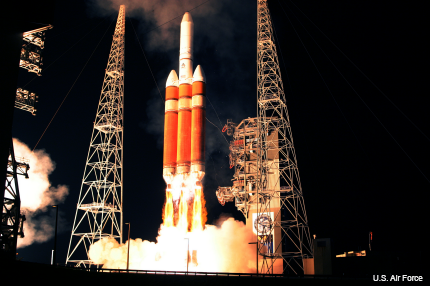Air Force asks court to dismiss SpaceX lawsuit
SpaceX shouldn’t be allowed to challenge the core rocket contract because the company didn’t respond to original RFP, the Air Force says.

In the latest development in the drama unfolding between the government and Elon Musk’s Space Exploration Technologies, the Air Force has asked a federal court to dismiss SpaceX’s lawsuit challenging the service’s Evolved Expendable Launch Vehicle contract with the United Launch Alliance, the Lockheed Martin/Boeing joint venture that provides space launches for the military.
SpaceX’s bid protest, filed on April 28, challenges a long-term, sole-source contract that guarantees the block purchase of 36 rocket cores from ULA. SpaceX claims that the contract should have been awarded competitively, and that its rockets would reliably provide launch services at an estimated cost savings of 75 percent. The current contract would maintain an ULA monopoly until at least 2018, according to a SpaceX announcement.
The Air Force originally intended to buy 36 rocket cores from ULA on a sole-source basis while putting another 14 missions for bid, according to SpaceNews. Half of the missions that would have been competitively awarded were then deferred by the Air Force after the purchase of the first batch of rocket cores from ULA, which occurred days before SpaceX’s third and final certification flight. The certification process for each flight takes around three months.
SpaceX had not yet finished the required certification flights that would have met the Air Force’s requirements, and thus would not have been a qualified bidder for the RFP at the time, according to the filing. The EELV program has launched more than 50 military and intelligence satellites since 2002.
The Air Force is asking the court to dismiss any challenges to the contract that allowed for the purchasing of the cores, arguing that SpaceX failed to object or respond to a public request for proposal issued in March 2012 for that purchase. Because SpaceX was not an actual or prospective bidder on the contract, the company should not be allowed to challenge the contract, the Air Force contends.
The Air Force also argues that SpaceX’s objection came only after SpaceX had acquired the ability to compete – the company did not object to the original solicitation, or at any point in the two years that the Air Force spent negotiating with ULA.
“Simply put, the fact that SpaceX did not find it necessary to challenge the procurement at the time it was issued does not give SpaceX license to now go back and seek to undo two years of planning and work by the agency,” the motion states. “To the contrary, SpaceX’s failure to timely object to the Air Force’s chosen contract vehicle bars SpaceX’s standing to challenge that vehicle now.”
SpaceX’s protest briefly halted ULA launches through a preliminary injunction that barred ULA and the Air Force from doing business with a Russian supplier, NPO Energomash, which allegedly was controlled by Russian Deputy Prime Minister Dmitry Rogozin.
reported
